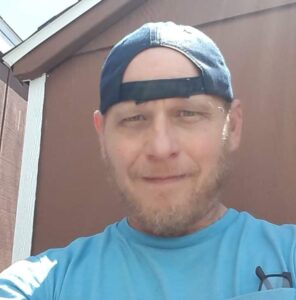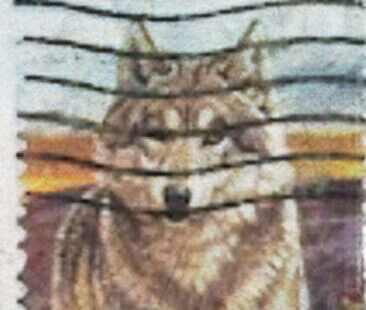Featured Writer: Andrew Riutta
First-person reflections on the art of writing haibun

When I was a young lad, my mother had a boyfriend who was very controlling and abusive. Downright mean. If his commands weren’t met to near perfection, more often than not it led to terrible things. Painful and humiliating moments. And so, as I’m sure you can guess, the dense gravity of his abuses didn’t come without deep, lasting consequence. Throughout my life, anything that possessed any of those ingredients—rules and proper steps, measures—with which he dictated and determined the hours of my day, I rejected.
This unfortunately included much of school, and learning in general. I wanted little to do with them. I obviously understood that some procedures had to be followed for certain objectives to be met. (You can’t cook spaghetti if your water’s not boiling.) But within my attempts at trying to follow those procedures, it seems, I developed a slight wobble—psychologically influenced, perhaps—that took me adrift from the normal aims and trajectories. And I guess it’s been not much different for me with writing haibun.
In all honesty, despite a steady interest in both haiku and tanka that dates back to the 1990s, haibun didn’t really hit my radar in a serious way until 2019. I had tried my hand at it, but I shied away (probably because of my fears of the traditional elements and “rules” then associated with haibun, such as the spare, almost elliptical language). But then a fellow poet from Michigan, Ed Markowski, sent me a printed manuscript for his Dystopian Dreamscapes: America in the 21st Century. It was not at all like any haibun poetry I’d ever before encountered. It followed its own voice wherever it brought it.
At five minutes after six, Cleo The Clown burst through the door of his trailer. He ran up and down the midway screaming the news like a speed ball juiced town crier. Everyone heard him clear as a gong but no one believed a word of it because every crooked game, every side show freak, every flimflam man, every fraud, and every magic act on every midway world wide was far more believable than men flying jumbo jets into skyscrapers.
Things inside me began to churn, and I felt like I was on a Tilt-A-Whirl. As I continued to read through the book, I kept looking over my shoulder, waiting for my mother’s boyfriend to show up with his knuckles . . . to enforce the haibun traditions and laws and pummel to dead meat such unruly foolishness. But he didn’t, and within the hour I managed to write a haibun into which I poured so much of myself—even the emotions of the very tender circumstances I was in that moment facing.
Sober
For six months now, I’ve been wringing out my brain.
And liver. Simple as that. The moments at hand are
the moments at hand. Nothing more. And I suppose
that ought to be good enough—perhaps as good as it
will get, anyway. Used to be I’d get drunk, and everything
was so alive and multidimensional. Interchangeable. I could
dance the same dance listening to Willie, Ravel, or Lady Gaga.
I’d float in all the cracks with a warm smile and, thank God,
booze raised to the stars. Now the days are kind
of like eating hardtack. Eating hardtack with bad teeth.
But still, there’s something to be said for the unclouded
virtues that things possess. Today, a strawberry smells like
a strawberry and not a woman’s saliva. Speaking of love,
well, don’t ask. If I had a bottle, the crow in the maple tree
outside my window would likely have all the answers.
But I don’t. So it doesn’t.hunting for beach stones I hit the jackpot . . . three plain rocks
The haibun itself was indeed a pivotal point (my hands were still nearly shaking from the withdrawals when I nailed it down, after just a short time of recovery from a decade of daily hard drinking). When I set out to write the haibun, I wasn’t sure where I was going to end up emotionally or how many torture chambers I might have to pass through, if not dwell in for days.
Afterward, when the writing was done, I felt as though I’d sat through an intense lightning storm. Electrified and exhilarated. I knew right then that I wanted more of the feeling. And I also knew that, to achieve this, I would most likely have to free-fall into my future pieces with the same “maybe I’ll die, maybe I won’t” approach.
Heart of June
And the ferns that we harvested from the dark woods
up north over a decade ago—from deep within a seemingly
endless cloud of mosquitoes—and then planted in the flower
bed right in front of the house, look so healthy this morning.
Indeed. When I was a boy, I’d nibble on the youngest, most
tender ones out back while hiding from my mother’s boyfriend.rope swing . . . it returns me again to where I wasHe always used to kick me in the ribs or stab me in the throat
with his finger for not remembering exactly where to add the engine
oil on the lawnmower. Not sure of whatever happened with him.
If he’s still alive. But I did hear that, after us, he moved even higher
into the Upper Midwest and became a volunteer firefighter or
something. Or maybe a cop. Anyway, someone who helps people
when a violent storm is sinking their boat. When the bullish wind
is smacking the hell out of their already cracked teeth.dirt-caked knees— in my survival kit, a small plastic Jesus
For better or worse, this approach has been the requisite for my contemporary haibun undertakings.
Life Out of Balance
I light a cigarette in the dark inside my camper while the wind
blows fiercely through the hills and its stars. “Koyaanisqatsi,”
I say to myself. It’s nearly four in the morning, but I can’t stop
thinking about that old Native woman with no indoor plumbing
who had an eagle feather dangling from a crucifix on her kitchen
wall. She said that, when the Lord comes back, she will give him
that feather and a bowl of corn soup, and maybe then Mother
Earth’s tumors will go back to being butterflies and she and her
people can be people again. I don’t remember if she said
anything else.instant coffee— I swallow the crack of dawn
Credits
- The excerpt of Ed Markowski’s writing is from “Turning Point,” the first haibun in his book Dystopian Dreamscapes: America in the 21st Century (Cider Press, 2019). A digital edition of the book is available in The Haiku Foundation’s Digital Libary: https://www.thehaikufoundation.org/omeka/items/show/5870.
- “Sober” first appeared in contemporary haibun online 15.4 (January 2020).
- “Heart of June” first appeared in Drifting Sands Haibun 16 (July 2022)
- “Life Out of Balance” first appeared in the Senryu Circle Facbook group and was reprinted MacQueen’s Quinterly 4: July 2020.
About the Author
Andrew Riutta was born and raised in the Upper Peninsula of Michigan. He is a father, chef, and Zamboni operator. His latest book, Blessed: Modern Haibun on Almost Every Despair (Red Moon Press, 2022), won the Haiku Society of America’s Merit Book Award for Best Haibun Book and was also shortlisted for a Touchstone Distinguished Book Award.

Outstanding Brave Brother
Stunning. Really stunning. I’m a fan
Such phenomenal work. Brilliant and brave, indeed.
Thank you for your candid reflection and bravery, Andrew. It is such a wonderful thing to see your successes ever since you sent me my copy of “Blessed . . . ” You’ve earned your stripes my friend. Congratulations a thousand times over. Keep up the good work. The deeper you dig into your soul, the more impressive the results.
Thanks, all, for the kind words. Really appreciate.
I’ll be Back,
When the Coffee is Burnt,
When Merle and The Bourbon are Dancing!
Love you My Brother!
In my opinion, you are one of the very best haibun writers out there. Please keep writing. I search yours out to read. They are fresh, raw, beautiful, and emotionally intelligent. And, as a person who spent much of their career as an advocate for domestic violence survivors, I find your work uniquely empowered. Thank you for this article and for the mention of Markowski’s Dystopian Dreamscapes-now I’ll have to look for it.